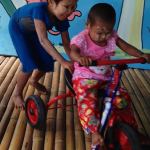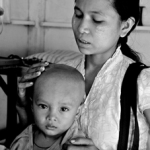Medical services in a city of extremes -printed with permission of Mike Kear
Medical Action Myanmar provide vital medical services to some of the poorest suburbs on the outskirts of Yangon. Services range from sexual and reproductive health, HIV testing and treatment, to treatment of malaria and tuberculosis (TB), all packed into four small but very efficient and effective clinics. The original and largest clinic in Hlaing Tha Yar township, which has been operational since 1994 and originally set up by Médecins Sans Frontières (MSF), serves a population of about 400,000 people and they typically see 300 clients a day.
What struck me most was the many pragmatic and common sense approaches they took to looking at the patient in the broadest sense. The efficacy of treating HIV is restricted if the patient is lacking in basic nutrition, as is so often the case in clients who discover they are HIV positive at the clinic. The clinic has a feeding centre which provides a balanced diet for a six month period for malnourished children. The centre is a fun place for the children to play and be monitored, thereby making feeding a more positive experience. MAM also provide what is called “Dry Rations” to patients on ART or TB medication that have dietary needs.
Health care in Yangon is generally regarded as poor with less that 0.5% of national budget spent on it. Yangon is growing at a rapid rate and accommodation in downtown Yangon is some of the most expensive in SE Asia, partly as a result of supply not meeting the demand from foreigners working for NGO’s and large companies with the resulting knock on effect to locals. There is severe economic hardship in the suburbs surrounding Yangon that the clinics serve. MAM provide assistance with transport fees for some HIV  positive patients to ensure they can attend clinic regularly.child in for treatment.
positive patients to ensure they can attend clinic regularly.child in for treatment.
The clinic has an outreach programme to encourage sex workers to attend the clinic for regular screenings for STIs including HIV. This includes a dedicated waiting area which is comfortably set up with coffee and noodles are served. This makes for a positive experience for anyone attending and provides a space to relax, chill out and share time with each other. The aim is to “make it their home” so they visit regularly, ideally every month. They have a trained peer educator who used to be a sex worker and she overseas the outreach programme. This also includes making a payment to women who recruit new patients and bring them to the clinic.
The clinic provides TB services, but unfortunately the government won’t allow patients to stay over night as it is not a hospital, so all patients have to go home. MAM now has a separate patient house for those that have to travel a long way to the clinic.
Kenro Izu – 2014 World of Children Health Award
Published on Nov 13, 2014
http://www.worldofchildren.org/kenro – Kenro is the recipient of our 2014 Health Award. Kenro founded Friends Without A Border, a children’s hospital in Cambodia, which has treated over 1.2 million children in Southeast Asia and provided advanced training to thousands of health workers. And now his award will go towards establishing the Lao Friends Hospital for Children in Luang Prabang, Laos.
http://www.foxnews.com/world/2013/09/16/myanmar-muslim-hospital-offers-hope-in-troubled-times/

Cassils focus on fledgling, grassroots charitable organizations
Friday, August 14, 2009
Cheryl Rossi
Published in the Vancouver Courier
John Cassils had just pulled out his video camera in a village in northern Laos in 1999 when he was invited into a hut to see a shaman dancing.
John, his wife Nina and four friends had been enjoying a 10 day trip by riverboat and four wheeled drive in the mountainous area near the Chinese border. They’d asked their driver to drop them off outside the village and walked in separately with no translator, although one friend who was in the Vietnam War spoke Lao.
A couple of heaps under a blanket in the corner of the hut soon drew John’s attention. They were the still figures of two young boys. John, a former family doctor, examined the three and four year old boys and found they were nearly dead from malnutrition. One child had lost 70 per cent of his vision and the other couldn’t stand because he had lost muscle strength.

In June 2009, Town & Country Magazine profiled Kenro Izu, Friends Without a Border, and the Angkor Hospital for Children.

Listen to a June 2008 Radio interview of John Cassils on CFUN Radio on the Shannon Nelson morning buzz program.
